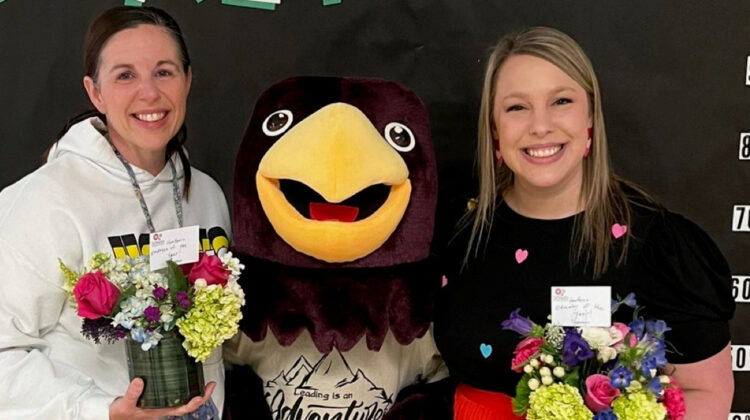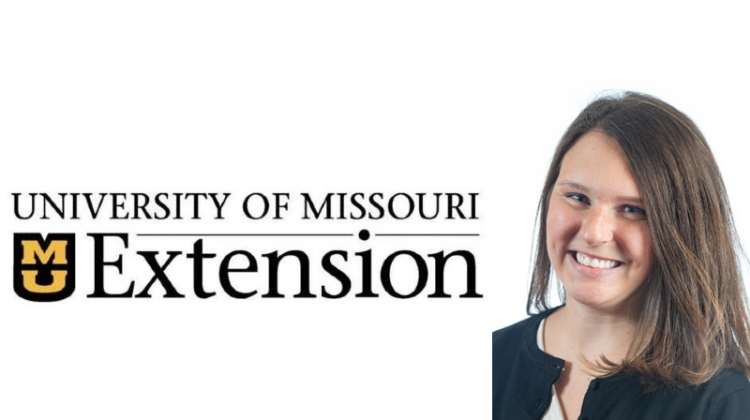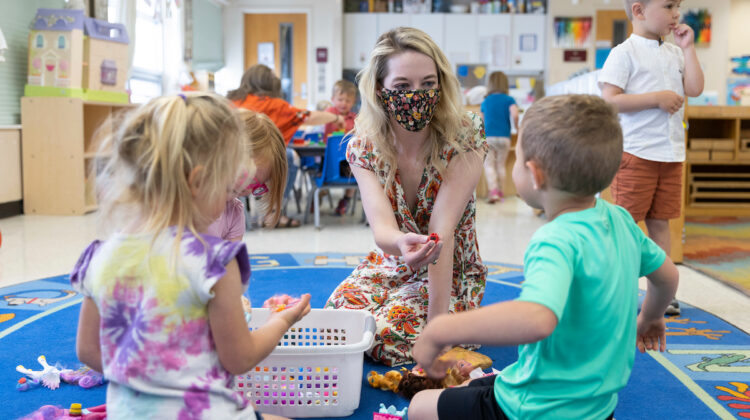For her excellence in teaching, Missouri State University alumna Courtney Baker received the Teacher of the Year award for Hawthorn Elementary School, based in St. Peters, Missouri.
Hawthorn is part of the Fort Zumwalt School District, which is headquartered in O’Fallon.
“I was really honored to have had five different nominations this year to win this award,” Baker said. “It feels good when your hard work is noticed. That’s not why you do it, but it feels good when people appreciate you. Our school does an assembly with all the kids gathered chanting your name, and it’s always so fun.”
Baker is also a finalist for the district’s Educator of the Year award.
From West County, St. Louis, Baker has been teaching for eight years. She currently teaches kindergarten but has also taught first and second grade in the past.
A positive Missouri State experience
Baker first attended Missouri State from 2011-2015 to pursue a bachelor’s degree in early childhood education. Wanting to become an expert in her field, she completed her master’s degree in early childhood and family development online in 2019.
The biggest impact on Baker during her education was Dr. Denise Cunningham, associate dean of MSU’s College of Education.
“She made it real for us,” Baker said. “She made it clear it wasn’t going to be sunshine and daisies every day in the classroom. She taught us real life survival.”
Though Cunningham was upfront with the realities of teaching, Baker found her lessons exciting and engaging.
“If she’s having this much fun teaching us, imagine how much fun we’re going to have when it’s our time as well,” Baker said.
Her favorite part of being a student at Missouri State was the energetic atmosphere.
“There’s so much to be a part of everywhere you look,” she said. “We always called it a big school with a small school feel.”
In her final year as a student, Baker served as president of University Ambassadors and received the Senior Woman of the Year award.
Impacting young lives
Baker comes from a long line of nurturing women with careers in nursing. While she always knew she wanted to help others, a job involving blood was off the table.
“To be honest, kindergarteners’ teeth falling out at random is pushing it!” Baker said.
Through her experiences working at summer camps and volunteering at a children’s crisis nursery, Baker’s heart discovered it had a special place for working with young children.
“They have such a passion for life and such a unique outlook,” Baker said. “You get to help them not just with their learning, but in becoming a good person as well.”
Recently, Baker read her students a book called, “How Full is Your Bucket,” as part of a lesson about spreading kindness to others.
“Now everything I hear is, ‘I’m filling their bucket,’ ‘they’re filling my bucket.’ It’s so sweet to hear,” Baker said.
When she started teaching at Hawthorn, Baker taught the same class of students from kindergarten through second grade. While learning three new curriculums in a row was challenging, Baker found the overall experience rewarding because she got to watch her kids grow and see their humor develop and their abilities change.
“It was really cool to forge a bond with those students and have trust and expectations built going year to year,” she said.
One of Baker’s favorite parts of teaching younger children is following their progress throughout elementary school.
“Sometimes the really, really quiet kid in kindergarten is the star of the school play in fifth grade. I love that I get to see these kids grow up and come out of their shells,” she shared.
Some advice to share
Baker tells students considering a career in early childhood education to “go for it; it’s super fun.”
She encourages students to attend practicum opportunities while at Missouri State to experience the classroom environment.
“What you go in thinking you want to teach might not actually be your calling,” Baker said.
She discourages those just entering the workforce from overwhelming themselves with the expectation of doing everything at once.
“Get in there, do your best and follow your curriculum,” she said. “Don’t try to be the ‘Pinterest Teacher.’”





